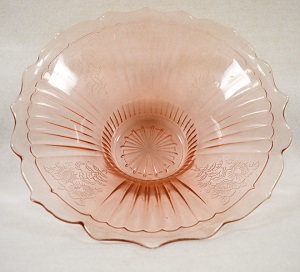
“My mother was full of sayings – ‘feed the mind as well as the body’ was one of them. So, we read newspapers. She might not have baking powder to put in the cornbread, but she bought the papers.”
Lois’ childhood memories are full of family and food around the oak dining room table in Tennessee. In the center of the table was always a bowl, on display here.
When I was about four, my parents bought their own home. And that is the house and the town that I associate with this bowl. It was there, on the round oak table. It would have sometimes fruit, sometimes nothing. Sometimes just some greenery that they’d cut off bushes out in the yard. Winter time, there wasn’t much they could put in there. I remember we’d always take the bowl off the table when we were playing Chinese checkers. We spent a lot time around that table as a family.
When her older sisters went to school, Lois would spend late afternoons at the table, waiting for them to return and watching her mother work magic in the kitchen.
My two older sisters were three and four years older than me, and when they went to school they left me home just my mother and I. And I would love the time sitting at the table, frost on the window, cooking whatever it was she was going to cook. Seemed that every day my mother would grasp her head and say, ‘Jesus, what am I going to cook today?’ And I remember thinking, ‘Jesus, please answer her.’ And every day a miracle would occur and food would end up on the table. She had to create things, and make things happen, and somehow she did.
Sometimes there wasn’t much food to go around. They were poor, though Lois had never thought of herself as such until she heard John F. Kennedy’s definition and measurements of poverty in the 1960s.
Everyone in my neighborhood lived like we did, and we didn’t know it was called poverty. It was a pretty good life, even though we were poverty stricken.
Lois’s mother made great efforts to secure a better life for her children – she was always encouraging them to go to college, and to think highly of themselves, with adages and activities.
She’d have us read Milton Cross’ great book of operas, books of etiquette ... She’d say she was preparing us to ‘sit down with princes and paupers.’ And we’d look at each other and laugh, and say, ‘Wow, she’s out there again.’ Another one of her phrases was ‘You were not bred in stagnant water at the corner.’ It meant that you are somebody. You’re not garbage. Where she pulled that stuff from, I have no idea.
Lois did go to college – with the financial assistance of one of the first United Negro Fellowships, and she went on to an illustrious career in the anti-poverty industry, working for the Community Action Partnership and directing the Upward Bound program at UC Riverside. Her upbringing gave her a compassion for the poor, and an ethic to encourage personal achievement.
I have respect for people who live in poverty — we lived in it, and we certainly respected ourselves! For a lot of people poverty is a matter of circumstance, and building up their faith in what they can do.
Today, the glass bowl from her childhood now has a place on her own kitchen table, and reminds Lois of all that her mother did to prepare her for the life she has led.
When I went to the White House for the first time, I thought, ‘Woah, princes and paupers. I’m sitting with the prince.’ My mother knew that one day we’d live better than they did.